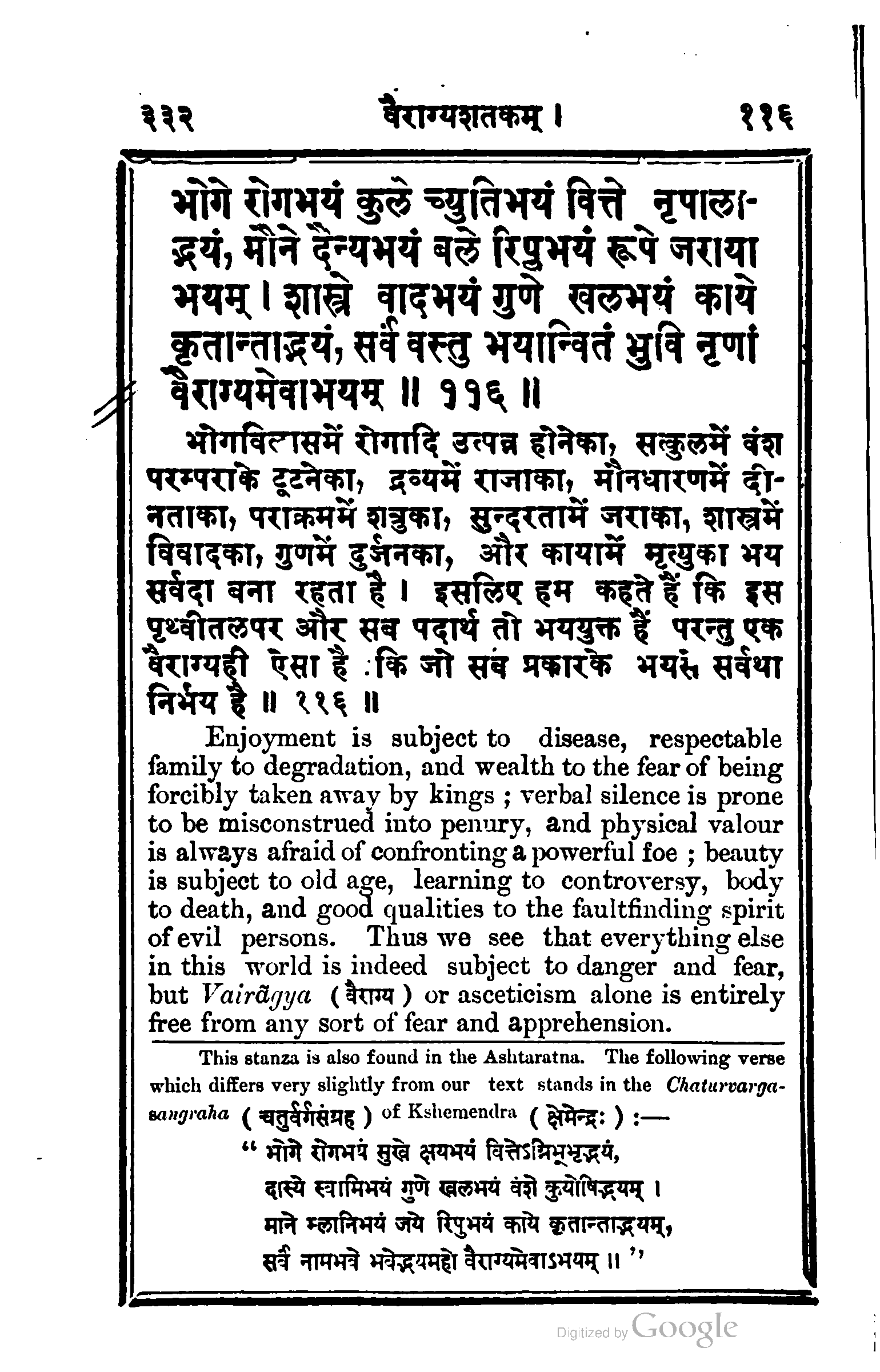Tawney
More
Mādhavānanda
Telang
verse

Text (not proofread)
भोगे रोगभयं कुले च्युतिभयं वित्ते नृपालाद्भयं :
मौने दैन्पभयं बले रिपुभयं रूपे जराया भूयम् ।
शास्त्रे वादभयं गुणे खलभयं काये कृतान्ताद्भयं
सर्व वस्तु भयान्वितं भुवि नृणां वैराग्यमेवाभयम् ॥ ३५ ॥
footnote

Text (not proofread)
XXXV . ( 6 ) मो ° ; मा ०. K. Bo . G. अराया ; तरुण्या . T. K. Bo . G.
( c ) ० द ; दि . K. Bo . G. N.
endnote


Text (not proofread)
St. XXXV . In [ case of ] silence there is the
danger of being [ considered ) spiritless . This however destroys
the symmetry of the Stanza . And hence the other reading would
be better as meaning " where there is high sense of one's own
greatness there is danger of misery . " This Stanza occurs at p .
6 of the Kavyasangraha . - S'árdúlavikridita .
Kosambi
verse

Text (not proofread)
भोगे रोगभयं कुले च्युतिभयं वित्ते नृपालाद् भयं
माने दैन्यभयं बले रिपुभयं रूपे जराया भयम् ।
शास्त्रे वादिभयं गुणे खलभयं काये कृतान्ताद् भयं
सर्व वस्तु भयान्वितं भुवि नृणां वैराग्यमेवाभयम् ॥ २ ९ ४ ॥
footnote

Text (not proofread)
294 { V } Cf. the variant sloka in Group III . Om . generally in N.
Found in D ( var . ) J1 ; F + V124 ( 23 , var . ) . [ Also GVS 2387 V104 ( var . ) ; BORI
326 V96 ( 96 ) ; ISM Kalamkar 195 V122 ( 125 ) ; BORI 328 V148 ( 40 ) ; Wai 2
V1051 ; Punjab 2885 V30 ; Ujjain T 6414 V106 ( 107 , var . ) . ] - Langen a 4 ) X सुखेऽसुख ;
Gat कुले च्युत ' ( for कुले च्युति ) . ( G6 [ 5 ] पलापाद् ( for नृपालाद् ) . 4 ) W तरुण्या
( for जराया ) . " ) Y1 बल ; T3 कल ( for खल ) . W 2 कार्ये ; Y1 . 4 काले ( for काये ) .
– d ) Y3 खलु ( for भुवि ) .
BIS . 4637 ( 2075 ) Bhartṛ . ed . Bohl . 3. 32. Haeb and Galan 28. lith , ed . I
and III . 29 , II . 101. Subhash . 88. Kävyakal . 3. Astaratna 5 ( Haeb . p . 8 ) ; SRB .
p . 370.90 ; SRK . p . 92 , 1 ( Bh . ) ; SA . 38. 35 ( var . ) . Kṣemendra claims this śloka
( var . ) as his own in Aucityavicāracarcã ( KM . 1 , p . 130 ) and Caturvargasamgraha
4.7 ( KM 5 , p . 98 ) .

